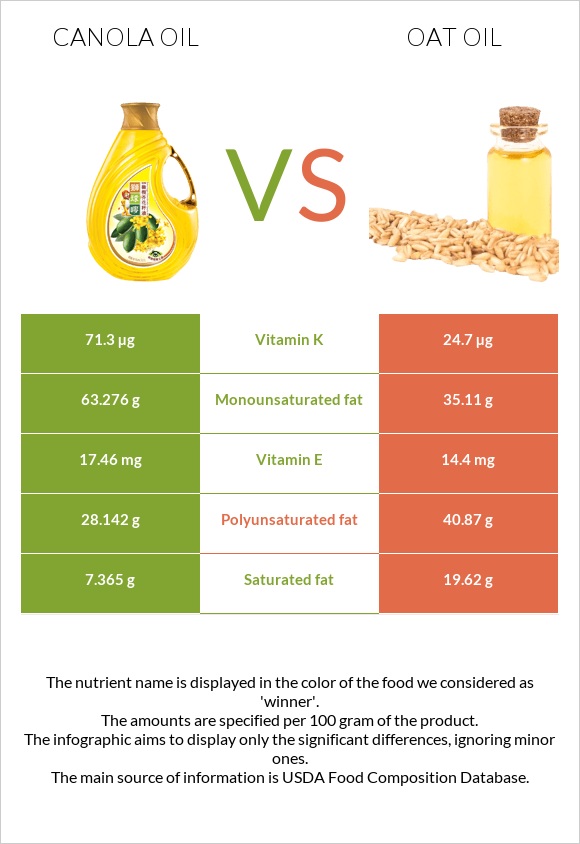Canola oil vs. Oat oil — In-Depth Nutrition Comparison
Compare
Significant differences between canola oil and oat oil
- Canola oil has more vitamin K, vitamin E, and monounsaturated fat; however, oat oil is richer in polyunsaturated fat.
- Oat oil covers your daily saturated fat needs 61% more than canola oil.
- Oat oil has 3 times less vitamin K than canola oil. Canola oil has 71.3µg of vitamin K, while oat oil has 24.7µg.
- Canola oil contains less saturated fat.
Specific food types used in this comparison are Oil, canola and Oil, oat.
Infographic

Infographic link
Mineral Comparison
Mineral comparison score is based on the number of minerals by which one or the other food is richer. The "coverage" charts below show how much of the daily needs can be covered by 300 grams of the food.
Vitamin Comparison
Vitamin comparison score is based on the number of vitamins by which one or the other food is richer. The "coverage" charts below show how much of the daily needs can be covered by 300 grams of the food.
| Contains more Vitamin EVitamin E | +21.3% |
| Contains more Vitamin KVitamin K | +188.7% |
All nutrients comparison - raw data values
| Nutrient |  |
 |
DV% diff. |
| Polyunsaturated fat | 28.142g | 40.87g | 85% |
| Monounsaturated fat | 63.276g | 35.11g | 70% |
| Saturated fat | 7.365g | 19.62g | 56% |
| Vitamin K | 71.3µg | 24.7µg | 39% |
| Vitamin E | 17.46mg | 14.4mg | 20% |
| Calories | 884kcal | 884kcal | 0% |
| Fats | 100g | 100g | 0% |
| Trans fat | 0.395g | N/A | |
| Choline | 0.2mg | 0% | |
| Omega-3 - ALA | 9.137g | N/A | |
| Omega-6 - Linoleic acid | 18.64g | N/A |
Macronutrient Comparison
Macronutrient breakdown side-by-side comparison
Protein:
0 g
Fats:
100 g
Carbs:
0 g
Water:
0 g
Other:
0 g
Protein:
0 g
Fats:
100 g
Carbs:
0 g
Water:
0 g
Other:
0 g
~equal in
Protein
~0g
~equal in
Fats
~100g
~equal in
Carbs
~0g
~equal in
Water
~0g
~equal in
Other
~0g
Fat Type Comparison
Fat type breakdown side-by-side comparison
Saturated fat:
Sat. Fat
7.365 g
Monounsaturated fat:
Mono. Fat
63.276 g
Polyunsaturated fat:
Poly. Fat
28.142 g
Saturated fat:
Sat. Fat
19.62 g
Monounsaturated fat:
Mono. Fat
35.11 g
Polyunsaturated fat:
Poly. Fat
40.87 g
| Contains less Sat. FatSaturated fat | -62.5% |
| Contains more Mono. FatMonounsaturated fat | +80.2% |
| Contains more Poly. FatPolyunsaturated fat | +45.2% |




